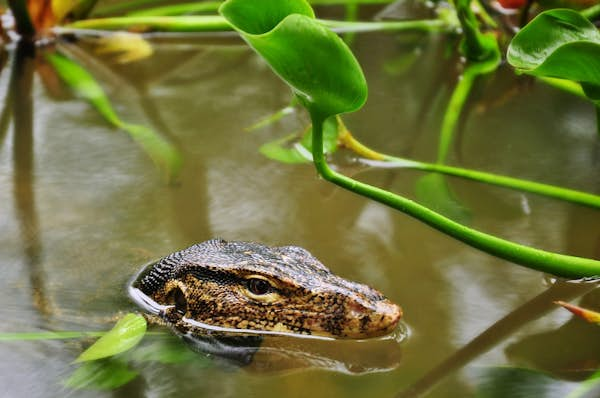For a tiny country, Singapore has some serious green space. Today, you’re more likely to see a squirrel scuttle across your path than come face-to-face with a tiger (sadly, Singapore’s last tiger was shot in the 1930s) but there are still places you can visit to get a taste of the jungle in the city. Here are our top five.

Sungei Buloh Wetland Reserve
Overlooking the Strait of Johor, this nature reserve in Singapore‘s far north is home to around 140 bird species. The best time for viewing its vast array of vivid-winged residents is before 10am, and if you visit on a weekday the reserve is blissfully serene. On top of great bird-watching, be prepared for encounters with unnervingly large monitor lizards. You can also observe playful otter families hunting fish and, if you’re lucky – a saltwater crocodile or two.

Singapore Zoo
Whatever your opinion of zoos, Singapore Zoo is among the world’s best. Many of its animals are free-ranging – there are few places outside of Borneo and Sumatra where you can stand under trees with orang-utans swinging a few feet above your head. Also watch out for the proboscis monkeys, unmistakable for their huge red bellies and gargantuan snouts. These monkeys are only found in the rapidly dwindling forests of Borneo and are rarely kept in captivity, so they’re a precious creature to share your space with.
Other highlights include the Fragile Forest, a large dome where lemurs wander around curiously, sloths hang around lazily, and large flying foxes munch fruit in front of your face. Next door, the newish River Safari offers the opportunity to view the wildlife of the world’s greatest rivers (don’t miss the giant pandas) and as evening closes in, the Night Safari uses open-concept enclosures to get visitors up close with nocturnal creatures such as leopards, free-ranging deer and the Malayan tiger.

Southern Ridges
Comprised of three parks – Mount Faber, Telok Blangah Hill Park and the Kent Ridge Park – linked by a series of walking paths, the Southern Ridges is one of Singapore’s most unique green spaces. Attractions along its eight trails include the raised-walkway Forest Walk, the 300m Floral Walk along a path lined with flowering plants and the Singing Forest, a collection of bird attracting native trees.
Mount Faber Peak is the highest point. To get to the top, ride the spectacular cable car from HarbourFront, take the shuttle bus, or gear up for the climb from the bottom. Faber Point, just west of the cable car terminus, is a tranquil, less contrived spot to soak up the views. Better still, you can do this over a Singapore sling at Altivo & Glass Bar – the perfect spot to watch the sun set over the straits.

Singapore Botanic Gardens
Like all great urban green spaces, entering Singapore Botanic Gardens provides instant relief: the roar of traffic melts into the branches and it’s easy to forget that you’re surrounded by 5.5 million people. Like most things in Singapore, the gardens are immaculate and well designed. Each area segues into the next, each with its own atmosphere, from the lazy serenity of the Swan Lake to the dense, humid greenery of the rainforest zone to the carefully pruned bonsai and orchid gardens: careful landscaping sits side by side with huge old trees that first poked their heads above ground when Queen Victoria was surveying her Empire.

Bukit Timah Nature Reserve
If the Botanic Gardens are an admirable exercise in managed vegetation, then the area officially (albeit uninspiringly) called the Central Catchment Nature Reserve is a masterpiece of urban wilderness planning. Bukit Timah Nature Reserve, the highest point on the island at 163m, is one of only two swathes of urban primary rainforest in the world (you’ll find the other one in Rio de Janeiro). Though it has been laid with a concrete path, side trails plunge deep into a forest so ecologically diverse that it prompted renowned British conservationist Dr David Bellamy to estimate that it may be home to more plant species than the whole of North America.
Linked to Bukit Timah is the MacRitchie Reservoir nature reserve, which is ringed with dozens of kilometres of trails, where walkers can spot macaques, monitor lizards, the occasional python and flying lemur – and walk across the Treetop Walk suspension bridge – before ending up at the peaceful reservoir park.
This article was first published by Lonely Planet in December 2010, and updated by Lonely Planet Destination Editor Sarah Reid in November 2014.
